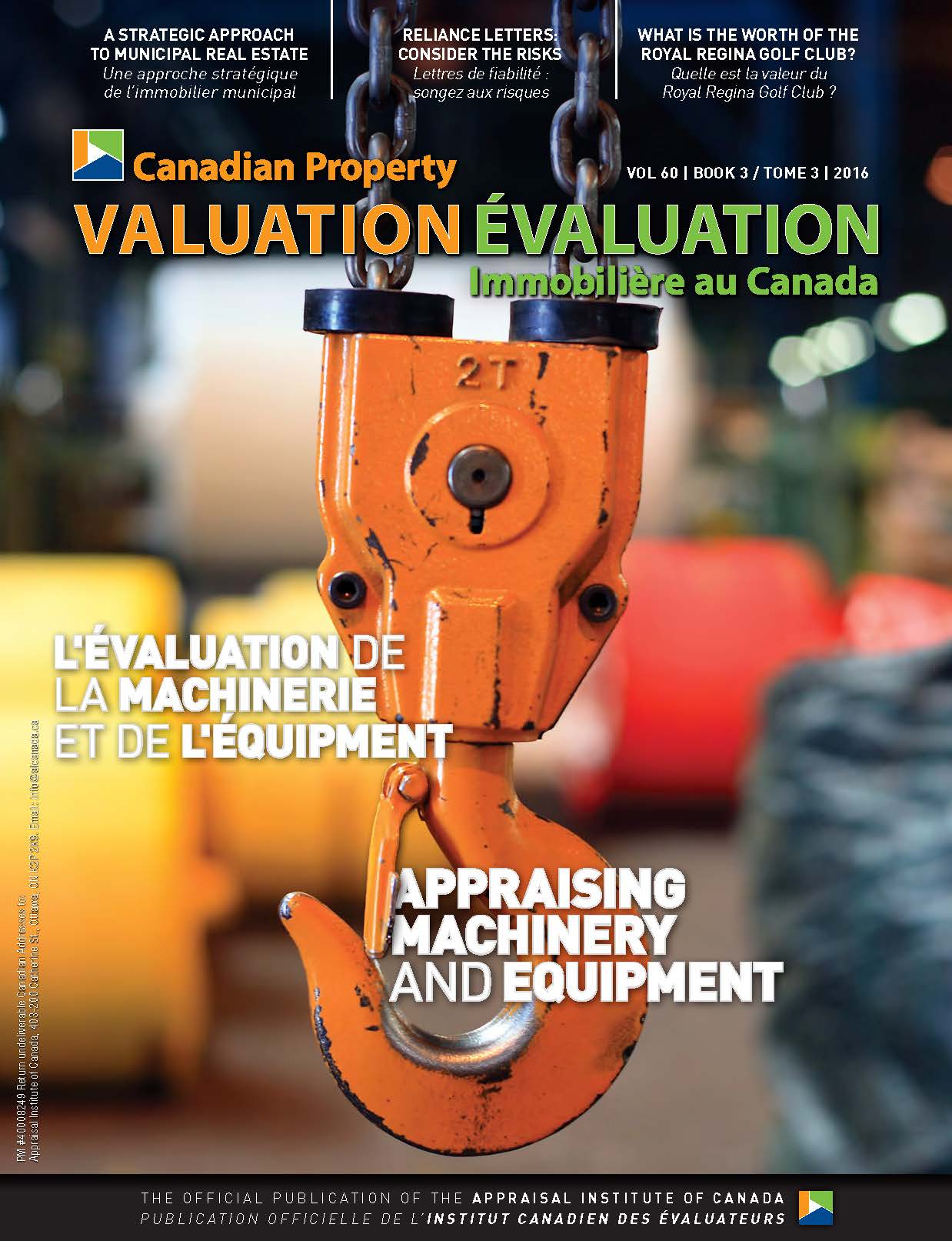EXPROPRIATION: ‘SPECIAL ECONOMIC ADVANTAGE’ REVISITED
Canadian Property Valuation Magazine
Search the Library Online
By John Shevchuk, C.ARB, AACI (Hon.), RI, Barrister & Solicitor
Volunteer Member, Appeal Sub-Committee
When property is expropriated, several jurisdictions in Canada expressly provide that the owner is to be compensated for ‘special economic advantage’ incidental to the use of the property that is not otherwise captured in the market value of the property. However, there are very few cases that a claim for such compensation has succeeded. One might ask why.
A case often relied upon to explain the rationale for recovery of ‘special economic advantage’ is the Supreme Court of Canada decision in Gagetown Lumber Co. v R. [Gagetown]. Freehold and licensed timberlands were expropriated by the federal Crown to facilitate the construction of a military base in Gagetown. The holder of the freehold and the licenses also ran a lumber mill and a lumberyard, the latter of which had rail facilities for exporting of the lumber. The timberlands were very close to the lumber mill and lumberyard and, because of this proximity, the court accepted that there was a value in the timberlands to the owners that would not accrue to parties not having the lumber mill and lumberyard. The court held that simply awarding the market value of the lands was not sufficient compensation.
Mr. Justice Rand wrote “Market value … may be the sole determinant, exhausting compensation, but it may not be. Where the position of the owner vis-a-vis the land is not different from that of any purchaser, that value is the measure; where the owner is in special relations to the land, as in the case of an established business, the measure is the value to him as a prudent man, what he would pay, as the price of the land, rather than be dispossessed, that price thereafter, in effect, representing the capital cost of the business to which the profits would be related… ”
Mr. Justice Locke, writing for himself and two other judges stated “… In determining the value to the owner, all advantages which the land possesses, present or future, in his hands, are to be taken into consideration, and he is entitled to have the price assessed in reference to those advantages which will give the land the greatest value. These timber limits, well served by roads situated so closely to the mill at Gagetown, had obviously a value to the appellant which they would not have to someone who did not have like facilities for converting the logs into lumber, and a long-established business designed and effective for disposing of the lumber at a profit… ”
The court’s approach in Gagetown was informed by the concept of ‘value to owner.’ Locke J. wrote: “As stated in Pastoral Finance Association Limited v. The Minister, the problem is to determine what amount a prudent man in the position of the owner would have been willing to pay for this property sooner than fail to obtain it … the question is as to what amount a prudent person in the position of the appellant company, with its long-established lumber export business, its facilities at Gagetown for the manufacture and shipping of lumber situated so close to the property, with access to it by good roads, being in possession of the property, but without title to it, would be willing to pay sooner than fail to obtain it.”
Gagetown sounds promising if your interests in real property are expropriated property, but what is its real effect today, particularly when the move in expropriation has been to compensation models based primarily on market value? To answer the question, we have to start with the expropriation law reform initiatives of the 1960s and 1970s that lead to some jurisdictions in Canada expressly providing for ‘special economic advantage.’
The following extract from the BC Report on Expropriation perhaps explains why recovery for ‘special economic advantage’ will indeed be rare:
B. Special Value
There are certain circumstances where market value would be insufficient as a measure of compensation. These occur where there is some element, which has only value to the owner or an insignificant number of prospective purchasers. This is referred to as special value.
The Ontario Law Reform Commission stated that circumstances of special value may exist in three different situations giving illustrations:
…
2. Where land has particular attributes, such as location or grade, which give that land a special value to the owner over other lands but which do not enhance market value.
The location of a service station on a particular corner, for example, may give that property a special value to the owner owing to the increased sales he would have there in relation to carrying on business on adjacent properties. The market value of the corner lot will not necessarily reflect the special profitability to the owner of having the location for this purpose.
…
The Ontario Commission concluded that compensation should be payable in all three situations on the principle of indemnification for loss. The Ontario Commission decided to treat [situation 2] under the heading of disturbance damage … The Ontario legislation implemented [this proposal] …
…
So far as the second situation, which relates to special economic advantage, is concerned, we agree that the example of the corner service station … is really one of disturbance damage, resulting from business loss. A better illustration might have been derived from the circumstances that existed in [Gagetown] … Even in those circumstances, however, it can be argued, that the loss is not one in the ‘value’ of the land, but a business loss that should be treated under disturbance damage … Perhaps disturbance damage could always cover this kind of loss, but we are not satisfied that this would be so. To ensure that recovery can be obtained in such cases, we think that it would be wise to have a provision … making compensable ‘the value to the owner’ of ‘special economic advantage’ arising out of his occupation of the land.
As can be gleaned from the foregoing, while the BC Law Reform Commission thought it likely unnecessary, providing for ‘special economic advantage’ should be a feature of expropriation legislation, just in case the other heads of compensation could not provide full indemnification for a taking.
The BC Law Reform Commission recommended, and the BC legislature accepted, that, in addition to market value for land, an owner should receive any special economic advantage arising out of the owner’s occupation of the land.
What then is needed to be awarded compensation for special economic advantage? In Arpro Developments Ltd. v. British Columbia, land was expropriated for constructing a terminal of a government ferry. The owner-developer had intended to develop the land for commercial-residential purposes. The Supreme Court of Canada ruled that the question for the arbitration panel was whether Arpro could prove that, because of circumstances peculiar to Arpro, the property had more value to Arpro than it would have had to another competent and knowledgeable developer putting the property to similar use.
The question of special economic advantage was recently considered in Clark v. New Brunswick (Minister of Transportation). The question was whether there was any special economic advantage associated with expropriated woodlots above and beyond the market value of the property. The owner argued that he had been attending to the woodlots in order to create a high quality forest, which would yield an elevated rate of return when he chose to harvest the timber. The court relied upon the Supreme Court of Canada decision in Canada (National Capital Commission) v. Hobbs for the proposition that special economic advantage must be measurable in terms of money – sentimental attachment will not form a basis for compensation.
The court in Clark also relied upon a passage from The Law of Expropriation and Compensation in Canada that the advantage must be special, in the sense that others using the property in the same general way would not enjoy. Mere potentiality and adaptability is not enough. The advantage must be capable of measurement in money. Finally, the advantage requires the owner to be actually using the property. On the facts in Clark, there was no evidence establishing a use of the woodlot that created value in excess of the market value. The woodlot value was captured fully in the market value appraisal. At paragraph 65, the court wrote:
The Court is empathetic to the Clarks’ situation. There is no question Mr. Clark has worked hard on his woodlots and the experience of expropriation was unwelcome and unplanned. However, as New Brunswick is a market value jurisdiction, the Court cannot stray into a ‘value to owner’ assessment of a property, unless there is evidence to establish a special economic value to the owner. Under the circumstances, to grant additional compensation to the Clarks would run afoul of the provisions of the Expropriation Act.
In summary, in jurisdictions where expropriation is based upon market value plus compensation for disturbance damages and special economic advantage, it remains the case that there is a very limited, restricted scope for arguing that full compensation for expropriated property has not been captured in the market value or through disturbance damages.





